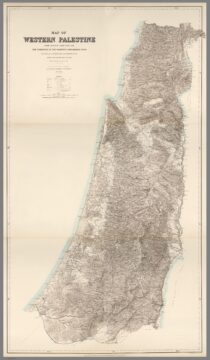Sudeep Dasgupta in the European Review of Books:
 Palestine, before it named something else, named a region. The region emerged during Ottoman rule, between 1518 and 1920. It was called Filastin in Arabic, the language of the Muslims, Christians, Jews and others who lived in this region. The word « Palestinians » could apply to all of them. It could refer to « Palestinians » beyond Palestine, too, as when Immanuel Kant, for example, referred to European Jews in 1798 as « Palestinians living among us » in his Anthropology from a Pragmatic Point of View. This is one of many things we’ve forgotten to remember.
Palestine, before it named something else, named a region. The region emerged during Ottoman rule, between 1518 and 1920. It was called Filastin in Arabic, the language of the Muslims, Christians, Jews and others who lived in this region. The word « Palestinians » could apply to all of them. It could refer to « Palestinians » beyond Palestine, too, as when Immanuel Kant, for example, referred to European Jews in 1798 as « Palestinians living among us » in his Anthropology from a Pragmatic Point of View. This is one of many things we’ve forgotten to remember.
Jews in the late-nineteenth-century Ottoman Empire, meanwhile, identified as Ottoman citizens, and, in the Empire’s Arab-speaking regions, as Arab. « Arab » could encompass Muslims, Christians, Druzes, Alevis and Jews. Another thing we’ve forgotten to remember is an intimate relationality — Muslims, Jews, Christians and others — forged within the Ottoman project by those in Palestine and beyond, long before our time. As the Ottoman Empire fractured in the early twentieth century and collapsed after World War I, the term « Arab » would acquire an increasingly political or nationalist edge.
More here.
